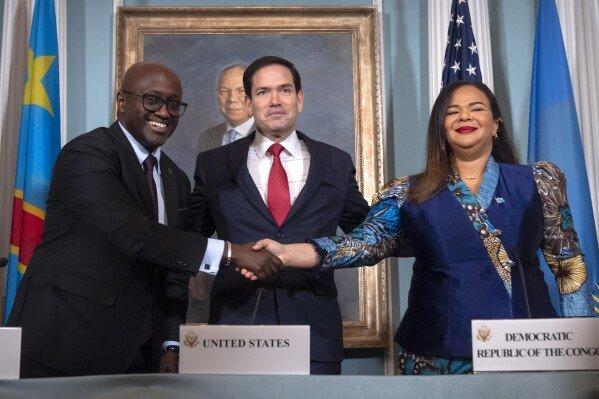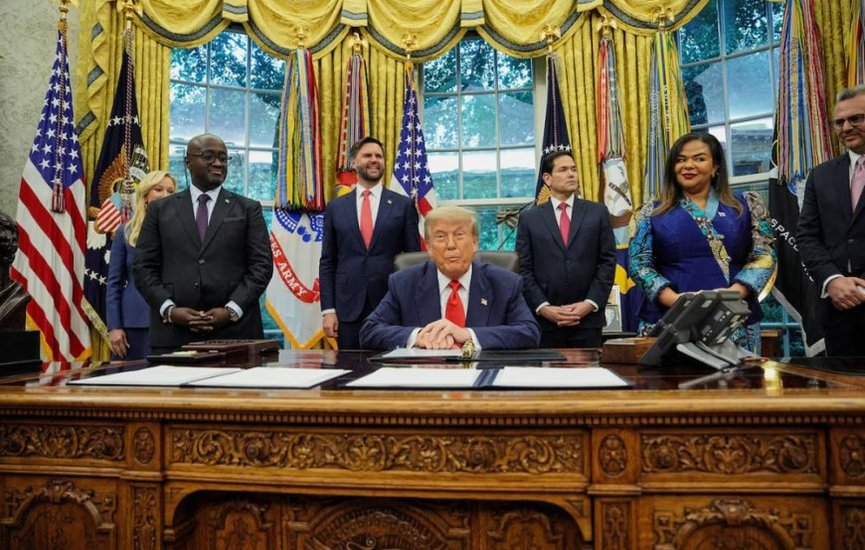WASHINGTON/PARIS/KINSHASA, June 27 (Reuters) - Rwanda and Democratic Republic of Congo signed a U.S.-brokered peace agreement on Friday, raising hopes for an end to fighting that has killed thousands and displaced hundreds of thousands more this year.
The agreement marks a breakthrough in talks held by U.S. President Donald Trump's administration and aims to attract billions of dollars of Western investment to a region rich in tantalum, gold, cobalt, copper, lithium and other minerals.
At a ceremony with U.S. Secretary of State Marco Rubio in Washington, the two African countries' foreign ministers signed the agreement pledging to implement a 2024 deal that would see Rwandan troops withdraw from eastern Congo within 90 days, according to a copy seen by Reuters.
Kinshasa and Kigali will also launch a regional economic integration framework within 90 days, the agreement said.
"They were going at it for many years, and with machetes - it is one of the worst, one of the worst wars that anyone has ever seen. And I just happened to have somebody that was able to get it settled," Trump said on Friday, ahead of the signing of the deal in Washington.


WHAT INITIALLY LED TO THESE WAR
The conflict between Rwanda and the Democratic Republic of the Congo (DRC)—often referred to as the Congo Wars—has deep historical, political, and ethnic roots. The war didn’t begin with a single event but developed over time due to a combination of factors. Here's a simplified explanation of what started the war.
The 1994 Rwandan Genocide
In 1994, Rwanda experienced a horrific genocide where over 800,000 Tutsis and moderate Hutus were killed by extremist Hutu militias.
After the genocide, the Rwandan Patriotic Front (RPF), a Tutsi-led rebel group, took power and the genocidaires (those who committed genocide) fled into eastern Congo (then Zaire).
Among the refugees were Hutu militias (Interahamwe) who began launching attacks into Rwanda from Congolese territory.
Ethnic Tensions and Natural Resources
The war has been fueled by: Ethnic conflicts between Congolese and Rwandan communities.
Control of mineral-rich areas in eastern Congo, which are economically valuable.
Presence of armed groups like the FDLR (Democratic Forces for the Liberation of Rwanda) in Congo, which Rwanda accuses of sheltering genocide perpetrators.
Recent Tensions (2000s–present)
Tensions continue today, especially due to:
Rwanda’s alleged support of the M23 rebel group.
Congo’s accusations that Rwanda is destabilizing its eastern provinces.
Rwanda’s security concerns about Hutu militias still active in eastern DRC.
First Congo War (1996–1997)
Rwanda and Uganda supported Laurent-Désiré Kabila in overthrowing Mobutu.
Kabila became president of the DRC in 1997, but soon fell out with Rwanda.
Second Congo War (1998–2003)
When Kabila expelled Rwandan forces from the country in 1998, Rwanda responded by backing new rebel groups, especially the Rally for Congolese Democracy (RCD).
The war escalated and drew in nine African countries, making it one of the deadliest wars since World War II.
Mobutu’s Weak Government in Zaire (Congo)
The DRC’s then-president Mobutu Sese Seko allowed the Hutu militants to operate in eastern Congo.
Rwanda saw this as a threat and began supporting a rebel movement inside Congo to overthrow Mobutu.
On June 27, 2025, the Democratic Republic of the Congo (DRC) and Rwanda formally signed a pivotal peace agreement—dubbed the “Washington Accord”—at a ceremony in Washington, D.C. The accord was brokered by the United States and Qatar, and witnessed by U.S. Secretary of State Marco Rubio, marking a potential turning point in a decades-long conflict rooted in the 1994 Rwandan genocide and subsequent regional tensions .
Core Commitments of the Accord
- Rwandan troop withdrawal: Rwanda agreed to fully withdraw its forces from eastern DRC within 90 days of signing .
- Demobilization of militias: Both nations pledged to end support for armed groups (notably M23 and FDLR), with plans for conditional disarmament and integration into formal security structures .
- Security coordination: A joint security coordination mechanism is set to be operational within 30 days to monitor troop movements and militia activity .
- Economic integration push: Within 90 days, the two countries are to establish a regional economic integration framework, aimed at securing U.S. investment in the region’s critical mineral industries (cobalt, coltan, lithium, etc.) .


Why the U.S. Stepped In
The U.S. intervened to broaden influence in Central Africa’s mineral-rich Great Lakes region, presenting a strategic counterweight to China's dominance .
American companies are now better placed to access key minerals, through an arrangement tied explicitly to the peace process .
Mixed Reactions: Hope… and Caution
Optimism: Congo’s FM Therese Kayikwamba Wagner described the accord as “a turning point” and said many who’ve suffered are “expecting this agreement to be respected” .
Secretary Rubio praised it as “an important moment after 30 years of war” .
Skepticism: President Putin Kagame of Rwanda welcomed the deal but cautioned that implementation depends on mutual trust, warning Rwanda would respond firmly if commitments are broken.
Critics note the exclusion of the powerful rebel group M23, which controls significant territory in eastern DRC and wasn’t party to the accord .
A UN report alleges that Rwanda has supported M23 with equipment and enabled mineral smuggling—claims Kigali denies, but which cast a shadow over enforcement .
The Road Ahead
M23 negotiations are proceeding separately in Qatar, with both the DRC and Rwanda hoping to broaden peace to include rebel factions .
Implementation challenges loom: past accords have faltered due to distrust, weak monitoring, and external interference .
Economic potential: if enforced, the deal could unlock billions in U.S.-led mineral and infrastructure investments in a region of immense resources .
